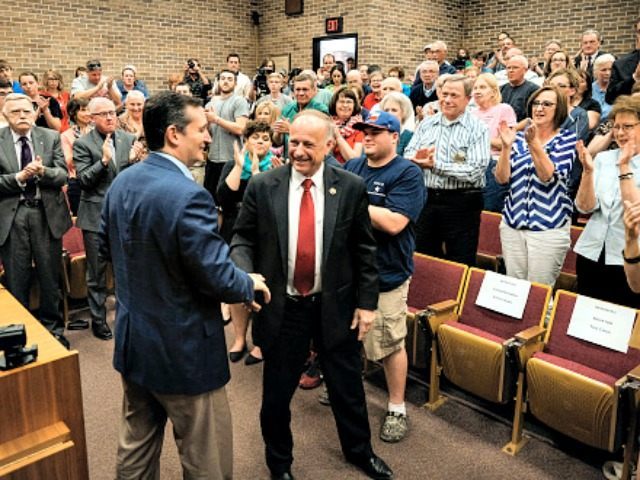The Republican establishment has lost control of the Presidential nominating contest, but it is flexing its muscle in down-ballot races.
Already this year, establishment Republicans have successfully turned back a number of conservative challengers. Now, the establishment is trying to take out one of the more successful conservative lawmakers, GOP Rep. Steve King.
King, who has represented northwestern Iowa in Congress since 2003, has been a leading conservative voice against ObamaCare, runaway government spending and, in particular, illegal immigration. He has been one of the strongest voices in Congress against granting amnesty to the nation’s 11 million illegal immigrants.
King isn’t being targeted by the Republican establishment for any of these positions, per se, however. King’s sin, in the eyes of many Iowa Republicans, was backing Texas Sen. Ted Cruz in the Iowa caucuses in February. Cruz opposes the federal mandate requiring ethanol be added to gasoline.
Cruz won the Iowa caucus, despite his “opposition to ethanol,” a major industry in the state. Although Rep. King is a long-time supporter of ethanol, he is being targeted as a way of atoning for Cruz’s victory.
The Cruz victory in the Iowa caucus was a major embarrassment to Iowa Gov. Terry Branstad, the nation’s longest-serving governor. Although Branstad didn’t endorse any specific candidate in the caucus, he strenuously campaigned against Cruz. Branstad said a Cruz victory “would be very damaging to our state.”
Branstad’s son, Eric, works for America’s Renewable Future, an advocacy and lobbying organization backed by the ethanol industry. Eric Branstad’s group ran hundreds of thousands of dollars in advertising attacking Cruz over his opposition to the ethanol mandate.
Requiring the use of ethanol in gasoline, which arose in response to the oil crisis of the 1970s, has long been a third-rail of Presidential politics. Iowa’s status as the first voting state in the nominating process has drawn pro-ethanol stances from virtually every candidate running for President in both parties.
It has long been assumed that no major candidates could successfully compete in the Iowa caucus unless they embraced the ethanol mandate. This year, with the exception of Cruz, every other candidate for President embraced the mandate. Even Donald Trump, who has based much of his campaign on challenging the Republican establishment, called for increasing the ethanol mandate while he was campaigning for the caucuses.
Cruz’s victory was further embarrassing to Branstad and the state’s ethanol industry because his opposition to the mandate was well known to voters. At the Iowa Ag Summit last year, Cruz spoke openly in opposition to the mandate and, in what may be remembered as a seminal moment in American politics, drew widespread applause for his position from the Iowa crowd.
Ethanol perhaps made some policy sense when the U.S. was worried about an over-dependence on foreign sources for oil. It is harder to justify this remnant of industrial policy when the U.S. has discovered its own abundant sources of oil. The last major accomplishment of the Republican Congress, remember, was winning approval for U.S. oil companies to sell domestic oil overseas.
Even the voters of Iowa seem to understand that the ethanol mandate has passed its sell-by date. An entire industry, however, has built up around that mandate. At least one major ethanol industry figure has promised heavy backing for King’s Republican primary challenger.
Bruce Rastetter, an ethanol mogul, has promised to back state Sen. Rick Bertrand in his challenge to Rep. Steve King. Rastetter is a major Republican donor in Iowa and chief organizer of the Ag Summit last year. He was a big donor to Karl Rove’s American Crossroads Super PAC in 2012. Rastetter made millions building Heartland Energy Holdings into one the nation’s largest ethanol companies, before selling the business in 2011.
Explaining his decision to run, Sen. Bertrand said, “I am not going in there to be a national figure.” He added, “I am going to be likable and effective.” On the one hand, Bertrand’s statement is typical of those made by establishment Republicans running against a strong conservative. The implication is that conservative members aren’t addressing the parochial needs of their district.
Rastetter’s support of Bertrand, however, shows this primary goes beyond simply defeating a conservative with a go-along Republican. A columnist for the Des Moines Register wrote:
[E]thanol interests have painted a target on King’s back for supporting the presidential campaign of Sen. Ted Cruz of Texas, who wants to eliminate federal energy subsidies and mandates.
King is popular in his district and has survived a number of serious election challenges. In 2012, he was challenged by U.S. Agricultural Secretary Tom Vilsak’s wife in a multi-million dollar contest that drew progressive activist groups from around the country. He won by a convincing margin, even as President Obama was winning Iowa in the Presidential contest.
This time, however, King faces a threat from his own party. The primary is June 7th, the same day the Republican Presidential nominating contest holds its final state contests.
Narratively, it’s a fitting bookend. The nominating contest began with a Cruz victory in Iowa, dealing a serious blow to the ethanol lobby. If the lobby succeeds in unseating King on the final day of the nominating contest, it can hope to salvage its government mandated industry. If it fails, however, the outdated ethanol policy may finally pass its expiration date.

COMMENTS
Please let us know if you're having issues with commenting.